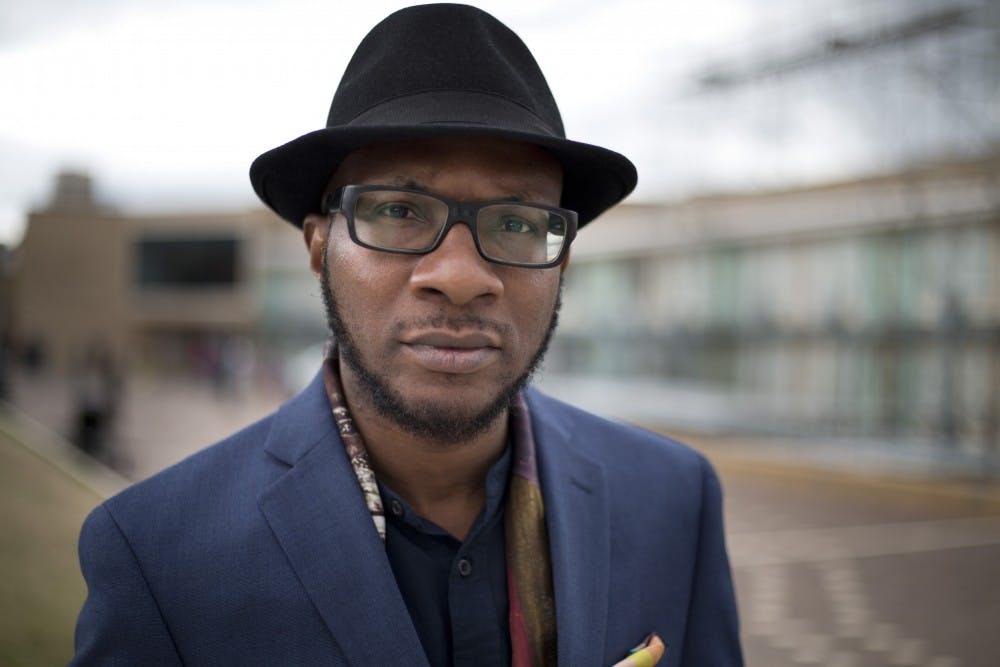Just as the centennial blends Ball State’s past and future, the event’s speaker knows stories are much more than a timeline.
Teju Cole, a novelist and photography critic for the New York Times Magazine, will host “Breaking Form and Getting Free: A Conversation Around Words and Images” on Thursday, Sept. 13.
Having lived in Michigan, Cole is no stranger to the Midwest, but his perspective is that of a perpetual outsider.
Cole was born in the United States, but his family moved to Nigeria when he was four months old. He remained there until he graduated high school, and went back to the United States for college.
“It was kind of a return home, in that sense,” Cole said.
Though Cole has now lived in the United States for most of his life, he still has what he calls an “outsider-ish energy,” not fitting well here nor in Nigeria.
“It really has shaped the way I see being American,” Cole said.
The photo critic and novelist studied art history and medical research while an undergraduate and his path through life is not one he said he could recommend to college students hoping to write or take photos for a living.
“If you look at your life in retrospect from where you are looking at the past, it’s quite interesting,” Cole said. “It makes sense. All your paths led you to here. But at the time when you’re going through it, it doesn’t make sense.”
Cole, who will be speaking to an audience of college students searching for their life’s path, said he can offer advice that has led to his success: doing work, generating his best and being intense. Those elements in combination, Cole said, are likely to bring anyone success.
The title of Cole’s upcoming conversation aligns with some of his most recent work in his book “Blind Spot.” There, he places a lyric poem on the left page of a spread, a photo of his on the right and creates a dialogue that, through the work, explores the places he has visited and the social spaces created.
Cole said his work also questions how society remembers the past and how that deep memory interprets experiences. In this way, Cole said a photograph transcends its outward beauty and “retrieves the past” in its interpretation.
“It’s supposed to push something nearer to the wall in some way,” Cole said.
This essence of remembrance and a way of analyzing it was something Tim Berg, an Honors humanities professor who had the idea to bring Cole to campus, thought was central to the centennial.
Berg isn’t the only professor who has taken note of Cole’s work. Jacinda Russell teaches art photography classes at Ball State and has assigned her students to study “Blind Spot” and his other work as a photo critic.
Russell, who said she has followed Cole for four or five years, sees the critic and novelist as a fresh, contemporary voice in media and to the art scene.
“He’s not like other photo critics and artists,” Russell said.
As an art major concentrating in photography and minoring in creative writing, senior Callie Zimmerman is part of the class reading “Blind Spot,” a work she calls “mysterious.”
“I was really interested in his work because a lot of my work is pairing photographic images with text,” Zimmerman said.
Zimmerman describes Cole’s work as complex, but not because of lofty verbage or academic jargon. Cole’s experiences in travelling and his perspective on America show in his work, and is something Zimmerman said she now knows she could incorporate in her own portfolio.
Cole’s lecture will begin at 8 p.m. in Emens Auditorium. Students can also apply to attend a workshop with Cole by emailing Berg at tdberg@bsu.edu.
Contact Sara Barker with comments at slbarker3@bsu.edu or on Twitter at @sarabarker326.





